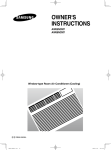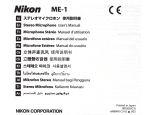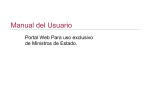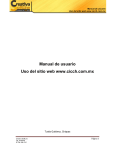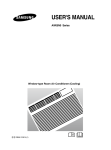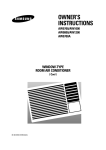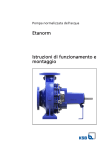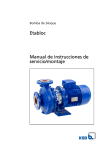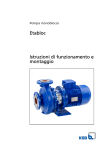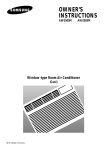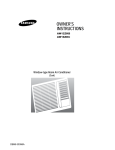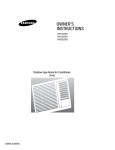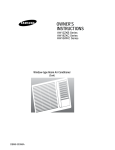Download Samsung AW05N0A User Manual
Transcript
USER'S MANUAL AW05N0 Series Window-type Room Air Conditioner (Cooling) E S DB98-26792A(1) DB98-26609A.indd 21 2006-10-12 10:19:15 Register your product at www.samsung.com/global/register Safety Precautions The following safety precautions must be taken when using your air conditioner. Risk of electric shock. • Can cause injury or death. • Disconnect all remote electric power supplies before servicing, installing or cleaning. • This must be done by the manufacturer or its service agent or a similar qualified person in order to avoid a hazard. WARNING DURING OPERATION DISPOSING OF THE UNIT OTHERS Users of this product are cautioned not to attempt repair of this product at their own discretion. Instead, they are requested to directly contact a designated service center or the outlet at which the product was purchased. Never spill any kind of liquid into the unit. Should this happen, unplug or main switch off the unit and contact an authorized service center. Do not insert anything between the air outlet blades because the inner fan may be damaged and could cause injury. Keep children away from the unit. Do not place any obstacles in front of the unit. Do not spray liquid of any kind into the indoor unit. Should this happen, switch off the breaker used for your air conditioner and contact your installation specialist. Make sure that the unit is correctly ventilated at all times: Do not place clothing or other materials over it. If the wireless remote control will not be used for a long time, remove the batteries. (If applicable) The air conditioner must be plugged into its own specific power source, which must be installed in compliance with national wiring,earthing and safety regulations. If the power cord is damaged in any way, it must be replaced by the manufacturer or its service agent or a similarly qualified person in order to avoid a hazard. This device must be installed according to the national electrical rules. The appliance must be installation that the plug should be easily accessible after installation. The breaker of the air conditioner should be all-pole switch; and the distance between its two contacts should be no less than 3.5mm. Such means for disconnection must be incorporation in the fixed wiring. Before throwing out the device, it is necessary to pull back the battery cells and get rid of them safely for recycling reasons. When you need to dispose of the unit, consult your dealer. If pipes are removed incorrectly, refrigerant may blow out and come into contact with your skin,causing injury. Releasing refrigerant into the atmosphere also damages the environments. Please recycle or dispose of the packaging material for this product in an environmentally responsible manner. Never store or ship the air conditioner upside down or sideways to avoid damage to the compressor. The appliance is not intended for use by young children or infirm persons without supervision; young children should be supervised to ensure that they do not play with the appliance. Max current is measured according to IEC standard for safety and current is measured according to ISO standard for energy efficiency. E- DB98-26609A.indd 2 2006-10-12 10:18:59 Contents PREPARING YOUR AIR CONDITIONER Safety Precautions ........................................................................................ Description of Each Component ................................................................... 2 4 Getting Started .............................................................................................. 5 OPERATING YOUR AIR CONDITIONER Cooling Your Room ....................................................................................... 6 Ventilating Your Room .................................................................................. Switching the Air Conditioner Off .................................................................. Adjusting the Air Flow Direction Horizontally ................................................ 6 7 7 RECOMMENDATIONS FOR USE Power Failure ................................................................................................ Temperature and Humidity Ranges .............................................................. 8 8 Cleaning Your Air Conditioner....................................................................... Solving Common Problems........................................................................... Technical Specifications................................................................................ 9 10 10 INSTALLATION............................................................................................. 11 E- DB98-26609A.indd 3 2006-10-12 10:18:59 Description of Each Component The design and shape are subject to change. Air inlet (Outside) Inner air flow blades (right/left orientation) Air outlet Air inlet (Inside) Air inlet (Outside) Air filter (Inside) Power plug (The type of the power plug may differ, depending on the local power supply). Power Control selector Thermostat Dial Fan Mode selector E- DB98-26609A.indd 4 2006-10-12 10:19:00 Getting Started You have just purchased a Samsung window-type Room Air Conditioner which should be installed following your Owner's Instructions. Your Owner's Instructions contain much valuable information on using your air conditioner. Please take the time to read them as they will help you take full advantage of the unit's features. The illustrations in the step-by-step procedures use four different symbols: PRESS PUSH IMPORTANT NOTE E- DB98-26609A.indd 5 2006-10-12 10:19:01 Cooling Your Room You must select the Cool mode if you wish to adjust the: Cooling temperature Fan speed when Cooling 1 To switch the unit on, simply press the Power Control selector to the "On" position. Result: 2 The air conditioner starts operating. Turn the Thermostat dial and set it to " 1 ~ 10 ". Possible temperatures: Can be set between 18 °C and 29°C . Result: The air conditioner starts cooling if the room temperature is higher than the selected temperature. 3 Press the "Fan Mode" selector to the High or Low position. Result: 4 The Fan speed is adjusted. To control the direction of the air flow,refer to page 7. Ventilating Your Room 1 To switch the unit on, simply press the Power Control selector to the "On" position. Result: 2 Turn the Thermostat dial and set it to "Fan only" position. Result: 3 The air conditioner starts up in fan mode. Press the "Fan Mode" selector to the High or Low position. Result: 4 The air conditioner starts operating. The Fan speed is adjusted. To control the direction of the air flow, refer to page 7. E- DB98-26609A.indd 6 2006-10-12 10:19:02 Switching the Air Conditioner Off You can switch the air conditioner off whenever you want. To switch the unit off, simply press the Power Control selector to the "Off" position. Adjusting the Air Flow Direction Horizontally Depending on the position of the unit in your room, you can adjust the orientation of the inner air flow blades on the unit. Adjust the air flow blades to the desired position by pushing them side to side. E- DB98-26609A.indd 7 2006-10-12 10:19:03 Power Failure If a power failure occurs, the air conditioner is switched off. When the power comes back on, the air conditioner will start up automatically. Temperature and Humidity Ranges The following table indicates the temperature and humidity ranges that the air conditioner can be used at. Mode Indoor Temperature Outdoor Temperature Cooling 21°C to 32°C approx. 21°C to 43°C approx. Indoor Humidity 80% or less If the air conditioner is used at... Then... Higher temperatures The automatic protection feature may be triggered and the air conditioner will stop. Lower temperatures A water leakage or some other malfunction may happen if the heat exchanger freezes. Higher humidity levels Water may condense on and drip from the surface of the unit if it is used for long periods. E- DB98-26609A.indd 8 2006-10-12 10:19:03 Cleaning Your Air Conditioner Be sure to clean the air filter periodically to keep the air conditioner operating at optimum level. When cleaning the air conditioner, turn it off and pull out the power plug. 1 Open the front grille by pulling the tabs on both sides of the grille. Then lift it up slightly to open the front grille completely. 2 Grab the tabs on the filter and pull it up and out. 3 Remove all dust on the air filter with a vacuum cleaner or brush. 4 When you have finished, insert the air filter back into its original position. 5 Wipe the surface of the unit with a neutral detergent and then wipe it again with a dry cloth. (Be sure not to use benzene, solvent, or other chemical products). If you... Then... Will not be using the air conditioner for a long period of time Set the fan going for a few hours to thoroughly dry the inside of the air conditioner. Switch the air conditioner off and unplug it from the wall socket. Clean the filter and outer surfaces. Have not used the air conditioner for a long period of time Set the fan going for a few hours to thoroughly dry the inside of the air conditioner. E- DB98-26609A.indd 9 2006-10-12 10:19:05 Solving Common Problems Before contacting an Samsung authorized service center, perform the following simple checks. They may save you the time and expense of an unnecessary call. Problem Explanation/Solution The air conditioner does not Check for a power failure. operate at all Check the voltage. (See the technical specifications). Check the power plug for disconnection. Check to see whether the Power Control selector is placed in the "OFF" position. (Set it to the desired position). Check to see whether the room temperature is too low. - Refer to page 8 for details about temperature condition. The air comes out smoothly, Set the THERMOSTAT dial to the desired position. -When the number on the THERMOSTAT dial is too high, but cooling is not effective. the room temperature may be too warm. Check to see whether there is an open window or other leakage of cool air to the outside. - Close the window and fill the gap. Check to see whether there is any obstacle adversely affecting the flow of air inside and outside the room. - Remove the obstacle or change the position of the air conditioner. Check to see whether the air filter is clogged with dust or contaminated with foreign substances. -Clean the air filter. Check to see whether there is any direct sunlight facing the air conditioner. -Block the sunlight with a sunshade. Check to see whether there is any electric device generating heat. -Do not use the air conditioner together with any heating device. Odors are permeating the Ventilate the room. room during air conditioning Technical Specifications Design and specifications are to change without notica Model Voltage & Frequecy Capacity Power Consumption Operating Current AW05N0AA 115V~, 60Hz 5050 BTU/h 520W 4,7A E-10 DB98-26609A.indd 10 2006-10-12 10:19:05 Installation Before installation, be sure to check the installation area or the air conditioner, and drain hose. Checkpoints prior to installation 1 Check the cabinet and front grille of the unit for any harmful defects such as scratches. 2 Be sure to check the power supply. - Refer to the specifications on the label attached to the unit. Installation Conditions 1 As the unit is heavy, the wall or window of the installation area should have sufficient strength and durability for operation of the air conditioner, and for prevention of any vibration or noise. If it is weak, reinforcement work should be performed separately. 2 It is advisable to install the air conditioner in the north or west side to prevent the effect of direct sunlight. When installing it in the south or east side due to unavoidable circumstances, it is advisable to install the sunshade to prevent the direct sunlight. In this case, take care not to cause any hindrance to the flow of outside air. 3 When installing the air conditioner, be sure to obtain sufficient space on the rear side of the unit for smooth flow of air. When operating the air conditioner in closed areas such as inner building with cooling operation, and result in trouble with the unit. See the illustration below. Awning 30mm min. 500mm 500mm 300mm 110mm 500mm Approx.3˚ 750mm 110mm min. 11 Outdoor side 45 45 Indoor side 100mm or more E-11 DB98-26609A.indd 11 2006-10-12 10:19:05













